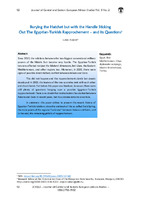Burying the Hatchet but with the Handle Sticking Out

Megtekintés/
Metaadat
Teljes megjelenítés
Link a dokumentumra való hivatkozáshoz:
Gyűjtemény
Absztrakt
Since 2013, the relations between the two biggest conventional military powers of the Middle East became very hostile. The Egyptian-Turkish tensions affected not just the bilateral dimension, but Libya, the Eastern Mediterranean, and other regions too. Moreover, in 2020, there were signs of possible direct military conflict between Ankara and Cairo. This did not happen and the rapprochement slowly but steady developed: in 2022, the leaders of the two countries met with each other and shook hands. Yet before this paper was finalised, however, there were still plenty of questions hanging over a possibleEgyptian–Turkish rapprochement. There is no doubt that normalisation has started between Ankara and Cairo in recent years, but its outcome remains uncertain.In summary: this paper strives to present the recent history of Egyptian-Turkish relations since the outbreak of the so-called Arab Spring, the main points of the regional “cold war” between Ankara and Cairo, and in the end, the remaining pitfalls of rapprochement.
- Cím és alcím
- Burying the Hatchet but with the Handle Sticking Out
- Szerző
- Krajcsír, Lukács
- Megjelenés ideje
- 2024-02-18
- Hozzáférés szintje
- Open access
- ISSN, e-ISSN
- 2786-1902
- Nyelv
- en
- Terjedelem
- p. 92-108.
- Tárgyszó
- Egypt, East Mediterranean, Libya, diplomatic campaign, Muslim Brotherhood, Turkey
- Változat
- Kiadói változat
- Egyéb azonosítók
- DOI: 10.59569/jceeas.2023.3.2.160
- A cikket/könyvrészletet tartalmazó dokumentum címe
- Journal of Central and Eastern European African Studies
- A forrás folyóirat éve
- 2023
- A forrás folyóirat évfolyama
- 3. évf.
- A forrás folyóirat száma
- 2. sz.
- Műfaj
- Tudományos cikk
- Tudományterület
- Társadalomtudományok - multidiszciplináris társadalomtudományok
- Egyetem
- Óbudai Egyetem
- Kar
- Bánki Donát Gépész és Biztonságtechnikai Mérnöki Kar
